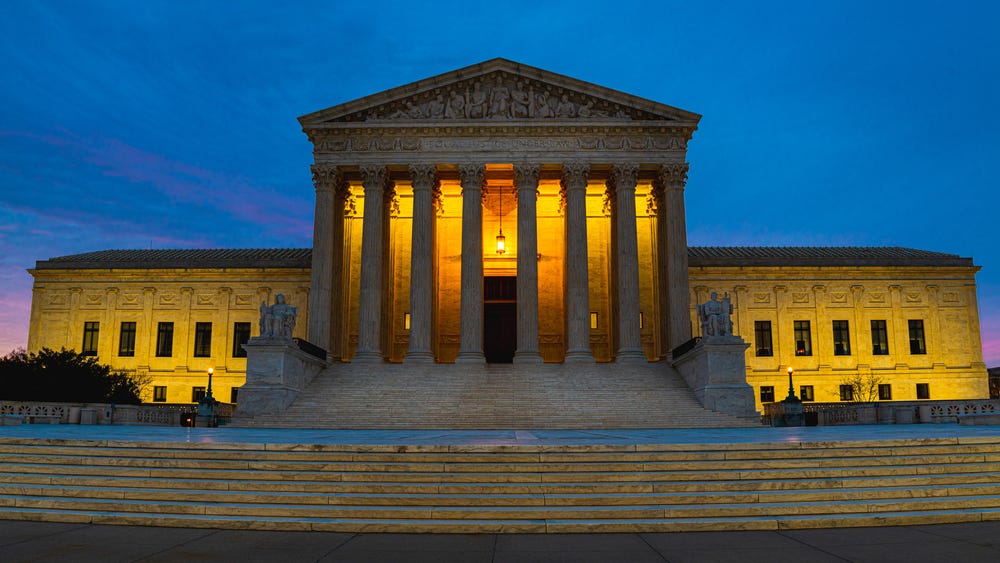E-Pluribus | September 23, 2022
The Supreme Court's coming opportunity regarding free speech, social media moderation is no job for the government, and illiberalism (unfortunately) grows in popularity.
A round-up of the latest and best writing and musings on the rise of illiberalism in the public discourse:
Washington Post Editorial Board: The Supreme Court should tread carefully on internet speech
Few dispute that the advent of the internet and social media in particular is far from an unalloyed positive development for mankind, but acknowledging problems exist and agreeing on appropriate remediation are two entirely different things. A recent case working its way through the courts may give the Supreme Court the opportunity to weigh in on the government’s role, and The Washington Post editorial board urges extreme caution.
[. . .] The court, if it agrees to take the case, will confront questions about governments’ ability to regulate speech in the digital age, which both sides so far have approached as all-or-nothing — but that really demand nuance and care.
Those two attributes were glaringly lacking in Judge Andrew Oldham’s majority opinion in NetChoice v. Paxton, the 5th Circuit case, which denies any First Amendment protection for what most people call content moderation by platforms but what its author insists on calling censorship. This conflicts with plenty of precedent on corporations’ right to decide what kind of speech they will host. But most alarming are the blatant mischaracterizations of social media sites that the opinion uses to justify this position. The assertion that neo-Nazi and terrorist materials are “borderline hypotheticals” ignores the platforms’ documented and ongoing game of whack-a-mole with just that type of hatred. The claim that sites “exercise virtually no editorial control or judgment” somehow misses the millions of pieces of content they review daily — and the many more algorithmic filters prevent from showing up at all.
This last point is supposed to prove that the government can classify platforms as “common carriers,” just like railroads or phone providers, and demand that they not discriminate. Those on the opposite side of this debate believe that’s the wrong analogy, and it is. But the alternative they propose is similarly shaky: They say these platforms are more like newspapers or radio broadcasters. The truth lies somewhere in between.
Read it all.
Jacob Sullum: The Government Can't Fix Social Media Moderation and Should Not Try
If The Washington Post editorial board is urging the Supreme Court to exercise extreme caution regarding the government and internet speech, Jacob Sullum of Reason goes even further, arguing the government should keep its nose out of it all together.
[. . .] Siding with the critics who complain about online "misinformation" poses an obvious threat to free inquiry and open debate. And while attempting to mandate evenhandedness might seem more consistent with those values, it undermines the freedoms guaranteed by the First Amendment in a more subtle but equally troubling way.
Under a Texas law that the U.S. Court of Appeals for the 5th Circuit declined to block last week, the leading social media platforms are forbidden to discriminate against users or messages based on "viewpoint." The "censorship" that Texas has banned includes not just outright removal of content and cancellation of accounts but also any steps that make posts less visible, accessible, or lucrative.
That means platforms are obliged to treat all posts equally, no matter how objectionable their content. With narrow exceptions for speech that is not constitutionally protected, Facebook et al. are not allowed to favor tolerance over bigotry, peace over violence, or verifiably true historical or scientific claims over demonstrably false ones.
While such neutrality is constitutionally mandatory for the government, imposing it on private actors violates the First Amendment right to exercise editorial discretion. The companies that challenged the law cited a line of Supreme Court decisions recognizing that right in a wide range of contexts, including a newspaper's selection of articles, a utility's control over the content of its newsletter, and a private organization's vetting of participants in a St. Patrick's Day parade.
Even assuming those cases established a general right to exercise editorial discretion, the 5th Circuit said, that is not an accurate description of what social media platforms are doing when they decide that certain posts are beyond the pale. Because they rely heavily on algorithms, do not review content before publication, and take action against only a tiny percentage of messages, Judge Andrew Oldham declared in the majority opinion, Facebook et al. "are nothing like" a newspaper.
Writing in dissent, Judge Leslie Southwick objected to that characterization. While "none of the precedents fit seamlessly," Southwick said, a social media platform's right to curate content is analogous to "the right of newspapers to control what they do and do not print."
Read it all here.
Alexander Salter & Philip Magness: A lament of rising illiberalism on the Right and Left
While the Left and Right enjoy pointing fingers at one another, Alexander Salter and Philip Magness writing for the Washington Examiner say both need to take a look in the mirror and see that finger pointing back at themselves when it comes to illiberalism.
As classical liberals, we cannot hide our dismay with contemporary politics. On the Right, the fusionist coalition that once offered old-fashioned liberals a voice within the GOP is falling apart. On the Left, Democrats treat as enemies of the state anybody who dares dissent from extreme progressivism. Now, even elements of the Libertarian Party are turning against classical liberalism, preferring outrage-stoking and noxious racialism to a principled defense of human freedom.
Federalism, free markets, and even the Constitution have few defenders in the public square. While we don’t expect sweetness and light from partisan contests, surely it’s reasonable to demand the political process respect quintessentially American beliefs. Turning away from liberalism means leaving behind part of what makes us who we are. Republicans, Democrats, and Libertarians have forgotten the difference between policy disagreements and civic loyalty.
There’s little room for our economic ideas in the Democratic Party. They’ve opposed free enterprise since the New Deal, if not earlier. But another, more recent illiberal turn is far more alarming: Democrats have turned their back on basic values such as free speech, toleration of dissent, and open scientific inquiry. Instead, they prefer totalizing wokeness , seasoned heavily with authoritarianism. Left-illiberalism infuses every aspect of life with "social justice" activism, from the ESG investment schemes of Wall Street to the monetary policy priorities of the Federal Reserve to the kinds of cars and appliances permissible to purchase. If Democrats get their way, everything social and cultural will necessarily become political. There’s no room for liberalism here.
Conservatives once paid lip service to freedom of contract, voluntary exchange, free trade, and fiscal discipline. Alas, those days are gone. Under the misleading cover of pursuing America’s "national interest," their policies single out politically connected industries as recipients of public largesse. Some are even heralding the revival of Henry Clay’s "American System" — a discredited platform of trade protectionism and subsidized infrastructure from the 19th century. These policies invariably devolve into political cronyism, as happened in the disastrous Smoot-Hawley Tariff of 1930, which triggered an international collapse in commerce and helped put the "Great" in the "Great Depression." As history shows, right-wing illiberalism is dangerous, too.
Read the whole thing.
Around Twitter
Via Christiane Amanpour, a great illustration of the priorities of the oppressive, authoritarian regime in Iran. Protests throughout the country, negotiations ongoing over Iran’s nuclear program, and Iran’s new president is more concerned with a female interviewer’s lack of a head covering in his presence:
Via Michael Shellenberger, a thread on dangers to Western Civilization. Excerpts below:
And finally, California, as always, on the cutting edge…











